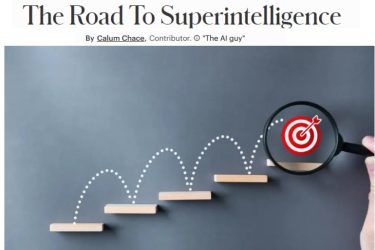The travelling salesman problem
You know the Travelling Salesman Problem? Find the shortest route that takes you to every city on a list and returns you home. It’s a hard problem. In fact it’s an NP-hard problem, where NP stands for non-deterministic polynomial time. Just in case you were in any doubt about how hard it is.
But if you’re a grocery retailer, delivering the weekly shopping to millions of homes, or the country’s leading furniture maker… well, it’s a problem you have to solve. Who you gonna call?
Tesco deliveries
Tesco not only has to deliver hundreds of thousands of orders every day: it has to take into account additional constraints such as driver shift patterns, road speeds, and the composition and capacity of the vehicle fleet. With the growth of the online delivery side of the business in the 2010s, the challenges were becoming more complex, and more serious. Tesco knew that customers were only going to get more demanding over time, not less.
To help solve their scheduling problem, they called Satalia, an AI consultancy in London. Tesco already had data analysis capabilities in-house, and obviously, world-class project management skills. What they saw in Satalia was a rare concentration of cutting-edge optimisation skills. Over three years, the two firms worked together to build a last-mile delivery stem from scratch. Tesco wasn’t interested in incremental improvement: they wanted a significant competitive advantage, which they achieved with something called dynamic scheduling.
Dynamic scheduling
Historically, customer orders placed on Tesco’s website would be batched and optimised at the end of each day. The new system compares the order location and basket size with every other order already in the schedule, and returns a verdict on the order’s feasibility and available slots in less than half a second. The schedule is always live and up-to-date, with the enormous benefit that customers can be offered many more slots without breaking the system. Furthermore, customers can now order same-day delivery, and they can be offered one-hour slots.
The resulting system is Tesco’s intellectual property, and as such, the financial impacts are confidential. But they have disclosed that the new system saved more than 11 million miles of delivery vehicle journeys in 2019, and it has improved the operation’s overall fuel efficiency by 5%. Just as important, it is robust. Covid caused a massive spike in online grocery deliveries – remember the great toilet roll scare of spring 2020? Tesco’s system, unlike some of its competitors, coped well as it scaled.
From groceries to furniture
DFS is a 50 year-old company, so it is obviously not a digital native. The name used to stand for Direct Furnishing Supplies, as its founding innovation was to cut costs by side-stepping the warehouse operators in the supply chain. It has only been an e-commerce business for five years, but as market leader, it had no option but to catch up fast.
Before working with Satalia, DFS staff used pen and paper to schedule deliveries. They would discuss delivery appointments with customers by phone, once the furniture was manufactured, a few weeks after ordering. Over the years, a number of myths and mysteries about deliveries took hold. There was no reliable data about what determined the time taken by each delivery – for instance whether the number of flights of stairs involved was more important than the time required to find a parking slot. (It turned out to be the parking, except where there were more than three flights.)
Mysterious Scots
There was a particular puzzle about Scotland. Across the UK as a whole, the average time taken at the delivery location was 31 minutes. In Scotland it was 28 minutes. Was this because the Scottish operation hired bigger, beefier staff? Did Scottish homes have fewer flights of stairs, or better parking? It turned out to be a matter of pride: the Scots simply decided they would be faster, and so they were.
DFS and Satalia worked together for four years to perfect the delivery scheduling system. Customers can now book their delivery online, giving them more control and more flexibility. Once again, Covid provided a rigorous stress test, with stores setting sales records every month, as locked-down customers upgraded their living rooms.
Efficiency
As with Tesco, the new system has significantly improved DFS’ delivery efficiency. Alex Salden, MD of its supply chain platform, the Sofa Delivery Company, estimates the improvement at more than 10% in both mileage and money. The company has rationalised its 92 warehouses down to 25 distribution hubs, and the new system has freed up 20 staff members to do more productive work than manually amending schedules over and over again.
The data provided by the new system has prompted DFS to change the work pattern of its delivery staff, moving to a pattern of four days on, four days off, which is becoming the industry standard. Shifting between nine and fifteen loads of furniture each day is physically demanding, and giving people more time to recover improves life for everyone. When a new brand, Sofology, was brought into the system, its delivery fleet of 350 vehicles was reduced to 250, with a commensurate saving in money and pollution.
Staff and suppliers
DFS also collaborated with Satalia to overhaul the workforce optimisation system inside its stores. This required a major overhaul of data sourcing and analysis, including historic sales information, marketing spend, weather forecasts, and much more. The result was a significant up-tick in revenue, with some stores reporting increases of nearly 20%. It also enabled shifts to be rebalanced to make them fairer: staff earn more commission on Saturday afternoons than their colleagues working on Monday mornings.
Finally, applying data science and optimisation skills has enabled DFS to analyse the reliability of their suppliers. The ability to predict the arrival of items in their warehouse more accurately reduces storage times, and makes the whole process more efficient, from factory to sitting room.
The future: digital twins
Where next for delivery companies? The science of artificial intelligence is 65 years old, but it is still very young. We are in the early stages of our AI journey, and there are enormous improvements in efficiency and effectiveness yet to come in all sectors of the economy. Companies like Satalia will use AI to build comprehensive virtual models of the physical and online operations of large organisations like Tesco and DFS. These models can be interrogated, analysed, and allow scenarios to be run in real time. Companies will use these models to fine tune their operations to optimise their financial performance, their working conditions, and their customer service.
These models are called Digital Twins, and they will be one of the most interesting developments of the Roaring Twenties.



